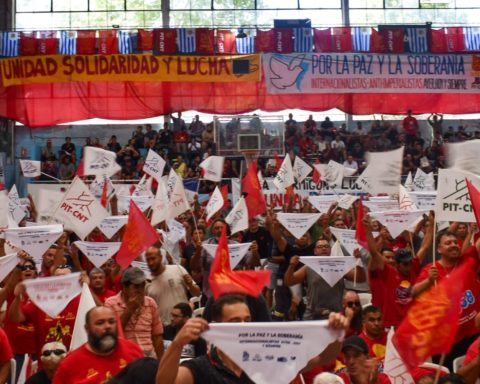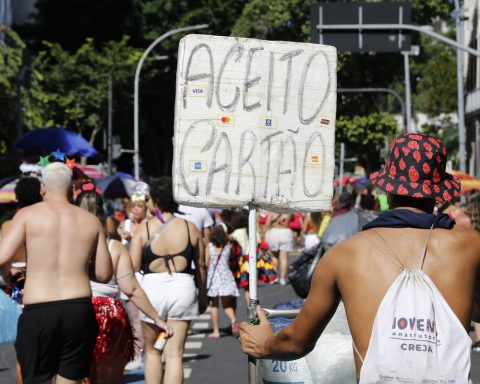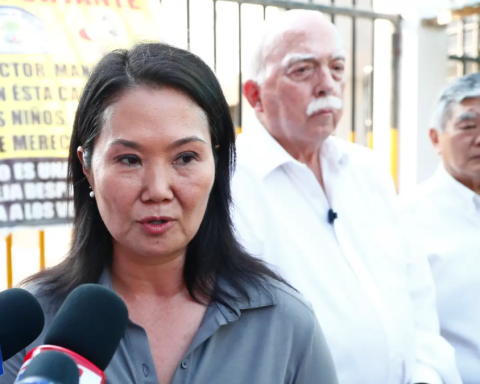The Electoral Court plans to communicate on the night of the same Sunday, March 27, the result of the referendum that proposes an appeal for derogation against 135 articles of the Law of Urgent Consideration (LUC). The exact time will depend on the completion of the primary count. Officials will transmit the figures in real time to the computer center, which will be uploaded immediately to the corporation’s website. There it will be officially known which of the two options will be the winner.
The operational issues are clear. What is not so lauded, judging by the opinion of experts, is the legal impact of an eventual victory of the Yes.
Almost the entire political system, in particular the promoters of the challenge, take it for granted that a victory for the pink ballot would imply that the provisions prior to the LUC would immediately return to force.
However, from a strictly legal point of view, this is not so clear.
interpretations
This will be only the fourth referendum in the history of Uruguay. The previous ones were the one referring to the Law of the Expiration of the punitive claim of the State (1989), the Law of Public Companies (1992) and the Ancap Law (2003). All were linked to very specific aspects, so the consultation on Sunday 27 will pose an unprecedented situation.
Matters relating to this type of instance are regulated by the Elections Law (16,017) of 1989, which in turn was modified by Law 17,244, of the year 2000. However, none of these initiatives regulated an essential aspect: what effects does an electoral consultation of this type when what is proposed is a repeal. And, above all, what happens after that repeal.
The reality is that there is no answer to express text. And the consequences of this lack divides the chair.
Eduardo Lust, deputy of Cabildo Abierto and an expert in Constitutional Law, has, for example, the view that, according to the general theory of Law, if a law that repealed another is in turn repealed by a new one, the oldest does not recover its validity.
To make his point clear, Lust says that it’s good to distinguish between two big sets.
In a first set are the contested articles that create rights, such as number portability, or those that gave rise to new situations, such as the adoption regime or the possibility of renting without guarantees. Those that are of an administrative nature also enter there, such as the new regime of fuel prices by import parity (PPI), as well as those that “added” new provisions to existing laws, adding subsections, lines or words.
In all these cases, according to the vision of the deputy lobbyist, there would be no major difficulty.
The central problem, he warned, is in the other set: the almost 80 articles of the LUC that totally or partially repealed or replaced previous regulations, expressly or tacitly.
Several examples fit there: a large part of the chapter referred to public security, criminal proceedings, police proceedings, financial inclusion or government of the educational system.
According to him, the triumph of the Yes would be creating a legal vacuum since the previous provisions, since in fact they were repealed when the LUC entered into force.
“The repeal of the 135 articles will not resurrect the previous articles,” he said.
In his opinion, for the articles repealed by the LUC, the interposition text proposed in the pink ballot should have also said: “restoring the text and the validity of the repealed articles.”
A risk”
Martín Risso, professor of Constitutional Law at the Catholic University of Uruguay, is of the position that a victory of the Yes will make the regimes prior to the LUC come into force.
However, he admitted the lack of unanimity. “It is an issue that has never been resolved. It is an important discussion and it represents a problem,” Risso told El Observador. In this sense, the expert said that the scenario of a Yes victory entails that “risk” from the legal point of view, by imposing a situation that had never been raised before and for which there is no clear rule.
But ultimately, Risso pointed out, it will be a situation that must be resolved at the level of the Judiciary.
Penalist Juan Fagúndez, for his part, has no doubts. “In my humble opinion, he goes back to the previous regimen,” he commented.
The two theses
In a opinion column published in The Observer In September of last year, Óscar Bottinelli, doctor in Political Science and director of Factum, recalled that the 1989 Election Law failed to define the effects of the repeal appeal.
According to him, this happened deliberately and for strictly political reasons.
That year’s referendum was against the Expiration Law, promoted without there being a regulatory norm yet.
Once the signatures were validated, those who worked on the regulation initially defined that the effect of the consultation was going to be “repealing”.
This implied in the facts that the expiration of the punitive claim had already operated from the moment the law entered into force, and that therefore there was no turning back and the referendum was worthless.
Bottinelli recalled that a protest by the National Pro Referendum Commission made them opt for a “Solomonic solution”: not defining what effects the repeal would have. Those responsible for negotiating and drafting the regulations at that time were Gonzalo Aguirre (National Party), José Korzeniak (Frente Amplio) and Miguel Semino (Colorado Party).
The effects of that decision not to decide extends to this day, staining the legal result of the referendum with ambiguity.
The director of Factum explained in his column that there are two conflicting theses. One of them maintains that a law ceases to exist from the moment it is repealed by the electoral body, without retroactive effect. Thus, it simply ceases to exist in the future and from the electoral act. According to this position, outside criminal matters – where the principle of the most benign law for the accused operates – the effects that the norm has produced until its repeal remain firm. And if the appealed law repealed a previous law -explained Bottinelli-, this thesis affirms that the provisions of the previous law do not revive.
The second thesis, he pointed out, implies that the repealed law never existed and all the effects that it could have produced during its validity are annulled. That is, its effects have always been, since the law was enacted. Therefore, each and every one of the repealed or modified norms is revived and all the new norms disappear, in addition to annulling all the acts carried out based on them.
What might be the effects and complex interpretive scenarios in each case? Again, not much to hold on to.
What is voted on 27?
In his argument, Bottinelli cites two provisions of the Civil Code that regulate the general scope of the laws.
Article 9 states that laws can only be repealed by other laws. Article 11, for its part, states that the repeal of a law occurs expressly or tacitly.
From there, Bottinelli explained, it is appropriate to analyze the arguments in favor of the nullifying thesis (the second).
If a law can only be repealed by another law –he pointed out–, they cannot be done through a referendum act.
On the other hand, Bottinelli highlighted in his column a general principle of law that states that appeals, when successful, annul the contested legal act. For Bottinelli, it seems clear that the effects of the referendum are of an annulment nature.
From this analysis, the director of Factum points out that what will be voted on March 27 will not be the maintenance or repeal of the contested articles, but their annulment.


















